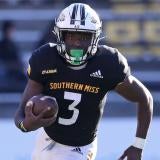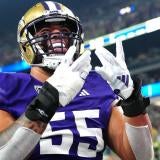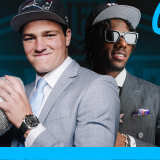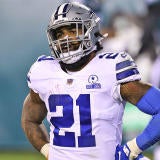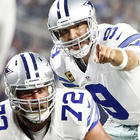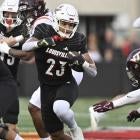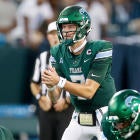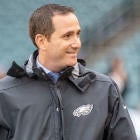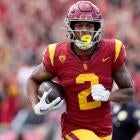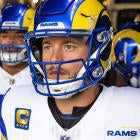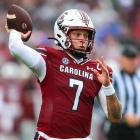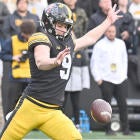The roster-building portion of the NFL offseason is all but over. Your favorite team's lineup is pretty much set, with the big names in free agency all snatched up and the 2016 NFL Draft in the books.
How did your favorite team do addressing its biggest needs heading into May and June OTAs? We're taking a team-by-team look with offseason exit interviews for each division. We kick off our look around the league with the NFC East.
| ||||||||||||||||||||||||||||||||||||
Three positives1. They're going back to the "take pressure off Tony Romo" offense. In 2014, Tony Romo had the best season of his career. After years of being one of the pass-happiest teams in the NFL and depending on Romo for all of their offensive exploits, the Cowboys flipped the script and ran the ball on a greater percentage of plays than all but two teams in the NFL. As a result, Romo led the NFL in completion percentage (69.9), yards per attempt (8.5), touchdown percentage (7.8), passer rating (113.2), and QBR (83.6) as he led the Cowboys to the NFL's second most-efficient offense on a per-drive basis. By asking Romo to do less, the Cowboys freed him up to do so much more. From the looks of it, Dallas wants to get back to the same style of game plan in 2016. Why else would the Cowboys have drafted former Ohio State star Ezekiel Elliott with the No. 4 pick in the draft? 2. Cedric Thornton makes a ton of sense next to Tyrone Crawford. In Crawford, the Cowboys have their pass-rushing defensive tackle. But during the past two years since he moved inside, they have not had a good run stuffer to clog up lanes next to him in the middle of the defense. They finished the 2014 and 2015 seasons 22nd and 29th in Football Outsiders' rushing defense DVOA (Defense-adjusted Value Over Average, which adjusts performance for down, distance, and opponent). They were particularly dreadful last season in power situations, allowing opponents to convert 76 percent of the time on third and fourth downs with 2 or fewer yards to go. Enter Thornton, who excelled as a two-gapping end in Philadelphia the past four seasons. 3. They no longer employ Greg Hardy. It's a shame that the Cowboys appear to have cut ties with Hardy due to his subpar on-field performance rather than his deplorable off-field actions, but in one particular case the result is such that we can ignore the process. Three negatives1. They had a questionable draft. Yes, it's hard to picture a rookie being put in better position to succeed than Ezekiel Elliott will be as a rookie, but that doesn't mean it was the best possible use of resources. The strength of the Cowboys' offensive line is such that almost anyone could find success running behind it. Just look at last season, when Darren McFadden -- he of that career 4.1 yards per carry average -- saw that figure jump to 4.6 in Dallas. Run-DMC ran for over 1,000 yards despite not starting until Week 7. Elliott should be excellent, but the Cowboys could have gotten comparable performance from any number of running backs for a fraction of the cost. The Cowboys also did not address need areas like the pass rush or the back end of the defense until Round 4 and beyond. Jaylon Smith could turn out to be a steal eventually, but for a team still squarely in win-now mode given Romo's age, it was an odd selection. 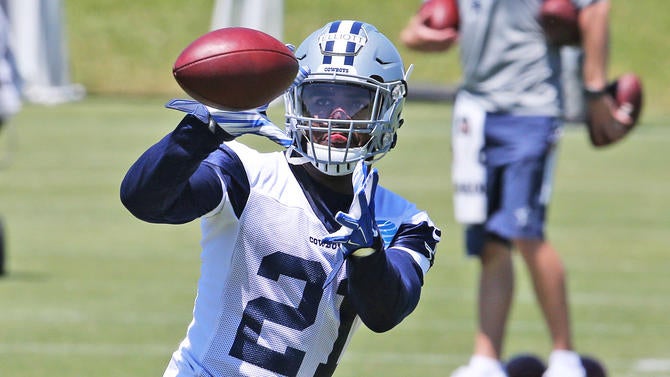 2. They didn't really address the secondary. The Cowboys have had one of the NFL's weakest defensive back units in the league for quite some time now. That they'll return basically the exact same core group from last season is not encouraging. Rather than finally cutting ties with draft bust Morris Claiborne, they re-signed him to a one-year deal. Rather than mercifully cutting free agent bust Brandon Carr loose, they restructured his contract to pay him a lower base salary but more in guaranteed cash. The only outside DB signing they made was journeyman Josh Thomas, and they didn't draft a corner or safety until Anthony Brown and then Kavon Frazier in the sixth round. 3. Their starting defensive ends are both suspended for four games. Randy Gregory picking up a four-game suspension for smoking pot again wasn't much of a surprise. He openly admitted he has a weed problem before his free-fall in the 2015 NFL Draft. But DeMarcus Lawrence also likely getting a suspension for the start of the season is killer for Dallas. Lawrence took a step forward in Year 2 and they were counting on him to be the anchor of their pass rush this season. That the Cowboys didn't really address the defensive end position in free agency (re-signing Jack Crawford was the most notable move there) and waited until the fourth round to grab Charles Tapper does not bode well for this team getting to the quarterback more often next season. | ||||||||||||||||||||||||||||||||||||
| ||||||||||||||||||||||||||||||||||||
Three positives1. They made significant upgrades to their defensive line. The surprising retention of Jason Pierre-Paul on a one-year deal was merely the start. The Giants also gave $85 million to Olivier Vernon to move north from Miami, and $46.25 million to Damon Harrison to trade green for blue. That trio, along with returning defensive tackle Jonathan Hankins, gives the Giants arguably the best defensive line in the division -- though Philly's is still excellent, too. Vernon still has to put it all together for a full season rather than just a stretch and Harrison has to transition from a 3-4 to a 4-3, but the fact that these guys are all playing on the same line should help. When you're in a division with the best offensive line in football, beefing up on the defensive front makes a ton of sense. 2. Sterling Shepard gives Eli Manning another shifty weapon. Eli and Odell Beckham have already become one of the NFL's premier passer-and-receiver combinations during ODB's two short years in the league. But everyone on the other side of the ball always knew where he was going with it. The potential return of Victor Cruz gives Eli another option, but he's not likely to resemble the player he was before. Sitting out a year-and-a-half will sap some of your explosiveness. Sherpard, though, is cut from the same mold. He's an exceptionally shifty slot man -- one of the best route-runners in this class. And he has Velcro for hands. Expect Manning to look his way early and often. 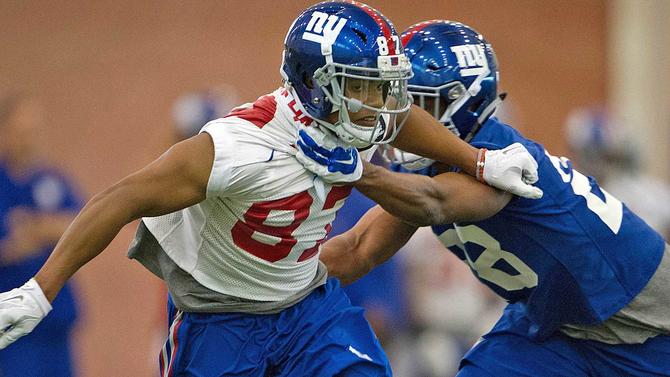 3. They got more athletic in the secondary. Janoris Jenkins has his faults -- he gambles too much and it results in too many deep passes -- but he will immediately upgrade the athleticism in New York's defensive backfield. Eli Apple, the Giants' first-round pick, is 6-0, 199 pounds and ran the 40-yard dash in 4.34 seconds at his pro day. Third-rounder Darian Thompson has good size at 6-2, 208 pounds and was known in college for his jaw-dropping plays on the ball. For a team that, outside Dominique Rodgers-Cromartie, did not have exceptional athletes in the secondary last year, this was a much-needed influx. Three negatives1. The offensive line is still a problem. When Marshall Newhouse is your big offensive line addition, that's not a great sign. Ereck Flowers struggled in pass protection as all rookies do, but his issues (lunging at defenders and getting himself off-balance, mostly) are the kind of things that don't necessarily correct themselves with experience. He's more of a big, mauling right tackle now shoehorned into the left side because of an injury to Will Beatty last preseason. Justin Pugh and John Jerry are nobody's idea of an elite guard tandem. And Weston Richburg called out everyone's work ethic not too long ago. 2. There's still uncertainty in the backfield. Shane Vereen was their most-talented running back, but he played only 38.2 percent of snaps last season, per Football Outsiders. That's the same percentage as Rashad Jennings, a much less versatile and explosive option. They'll both be back in 2016, and the Giants added pass-catching back Bobby Rainey from the Bucs and drafted UCLA's Paul Perkins in the late rounds as well. That's a lot of talent, but the Giants haven't exactly shown they're up to managing backfield crowds before. They might benefit from a more clear delineation of both talent and role. 3. Their coaching change was a half-measure. On the classic television show Breaking Bad, the actor Johnathan Banks played a character named Mike Ehrmantraut. Mike, an enforcer for a drug cartel, was also a former police officer. In order to illustrate a point to the show's main character, Walter White, Mike told Walter the following story. Mike's point encapsulates the main flaw in the Giants' offseason. Tom Coughlin is gone. Installed in his place is ... Coughlin's offensive coordinator, Ben McAdoo. Along with McAdoo, 12 assistant coaches are returning from last year's team. Even old friend Kevin Gilbride (once derisively nicknamed by Giants fans as Kevin Kill-drive) is back in the fold as tight ends coach. (Note: It is apparently Gilbride's son in this position, not Gilbride himself.) Not only that, but general manager Jerry Reese still has his job, despite the fact that owner John Mara said the blame for the Giants' last few seasons mostly lied not with Tom Coughlin, but with the team's subpar roster. It sure seems like the Giants made a change for change's sake, not because they actually wanted to see real change. This is what Mike would call a half-measure.
| ||||||||||||||||||||||||||||||||||||
| ||||||||||||||||||||||||||||||||||||
Three positives1. They unloaded some bad contracts. Five years and $47.75 million owed to Byron Maxwell: gone. Four years and $25 million owed to DeMarco Murray: gone. In a pair of trades that netted the Eagles a move from No. 13 to No. 8 in the draft and a fourth-round pick swap, respectively, the Eagles lopped off two very large contracts they gave out last offseason that looked destined to clog their books for years. Instead, they got out from underneath and were able to use the room they created to land players like Brandon Brooks and Rodney McLeod. 2. They identified their QB of the future and made a move to get him. At some point during the draft process, the Eagles decided Carson Wentz was their quarterback of the future. Given that they were originally slated to draft at No. 13, they didn't stand much chance of getting him when the offseason started. Through a series of moves, the maneuvered their way up to No. 2 in the draft and got their man. 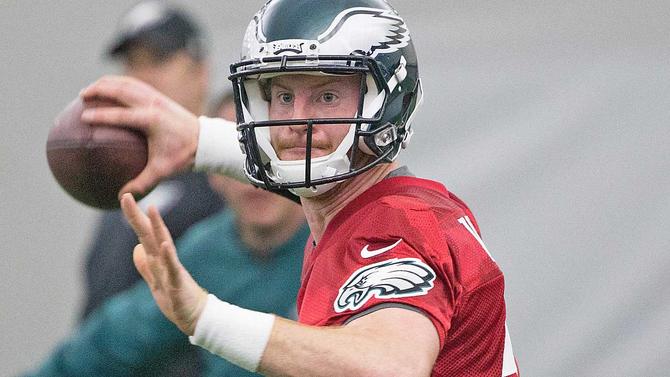 3. They cemented the best pair of safeties in the division. The Eagles already had the best safety in the NFC East in Malcolm Jenkins, and they added former Rams safety Rodney McLeod in free agency. McLeod's a former undrafted free agent who played his way over the last few years into one of the biggest contracts among players at his position. Here's what an NFC West scout had to say about McLeod:
When you have to deal with Odell Beckham, Dez Bryant, Jason Witten, DeSean Jackson, Pierre Garcon, Jordan Reed, and Vernon Davis in your division, having a good pair of safeties is pretty important. Three negatives1. They gave up too much to go get Wentz. The No. 8, No. 77, and No. 100 picks in this year's draft, plus a 2017 first-round pick and a 2018 second-round pick. That's a whole lot of value to give up. As we wrote at the time, the Browns won the "value" of the trade based on this year's picks alone. Factor in the future picks and it's a landslide. The Eagles could, of course, be right about Wentz being a franchise QB. If they are, this trade isn't a terrible one. If they're wrong, it's a disaster. And considering the track record teams have of identifying good quarterback prospects (especially when trading up), it's more likely that they're wrong than that they're right. 2. They fired a good coach because he was a bad GM. In 2013, Chip Kelly took over a team that went 4-12 and was outscored by over 10 points per game the year before. In two-plus seasons as head coach, Kelly led the Eagles to a 26-21 record, including back-to-back 10-6 campaigns in his first two years. His quarterbacks during that time were Nick Foles, Mark Sanchez, and Sam Bradford -- that's not exactly a murderer's row of talent. But Kelly gave out a couple bad contracts during his first offseason as the team's lead personnel man, and it led to his ouster. It's possible the result turns out OK, but it's hard to imagine a coach being able to get better results out of the roster during the past three seasons, so the process needs to be scrutinized. 3. They gave a combined $56 million ($24.5 million guaranteed) to two QBs who ideally will never start for them after this season. Two years and $35 million for Sam Bradford. Three years and $21 million for Chase Daniel. And if the Eagles are correct in their appraisal of Wentz, neither one of them will see any playing time once the rookie is ready to step on the field and take the reins. That's not the best use of resources. | ||||||||||||||||||||||||||||||||||||
| ||||||||||||||||||||||||||||||||||||
Three positives1. They gave themselves another year to find out what they have in Kirk Cousins. Would you rather Quarterback A or Quarterback B?
It seems pretty obvious you would choose Quarterback B. The problem is that they're both Kirk Cousins. Quarterback A is Cousins' first three seasons while Quarterback B is Cousins in 2015. Washington could have elected to give Cousins a long-term contract this offseason, betting that the "real" Cousins is the one who showed up in 2015. Instead, they simply used the franchise tag on him, giving themselves one more year to see exactly what they have here. Considering his lack of track record, it makes sense to wait things out and make sure he's the real deal before committing big money over a number of years. 2. They added more explosive targets to give Cousins every chance to succeed. If you want to find out if your quarterback is the real deal, there's no better way to do it than by giving him a ton of weapons to throw to. Cousins already had a heck of a trio in DeSean Jackson, Pierre Garcon and Jordan Reed, but Washington went out and added Vernon Davis in free agency and Josh Doctson in the draft anyway. Doctson's skill set in particular should be a big help to Cousins -- his best attribute is the ability to turn inaccurate throws into completions. If Cousins' accuracy dips back to pre-2015 levels, that should help him stave off a big drop. Davis has always been a player with more hype than production, but he's a good complementary piece to use in the red zone.  3. The secondary got a huge boost with the arrival of Josh Norman. Washington got a find in the secondary when it took Bashaud Breeland in the fourth round two years ago. Safety Su'a Cravens was a good pick in Round 2 this year. But Josh Norman is a player of far higher quality than anyone Washington had in the defensive backfield the past few years. Even before his breakout 2015 campaign, Norman had been a good player for a while. He also has had very high-profile feuds with the two best receivers in this division -- Odell Beckham and Dez Bryant. He now gets to line up across from those guys four times a year. Three negatives1. Norman's contract is massive and could come back to bite them. Norman has only four years of experience and he's already 28 years old. He entered the league out of Coastal Carolina at 25. The contract Washington gave him pays $75 million over five years, $50 million of which is guaranteed. If Norman stays elite, that's probably somewhere around equivalent value for his services. If he drops off a little, it's an overpay. If he drops off a lot, it's a disaster. There's just probably not much chance of them getting excess value out of the contract, which should always be the goal. 2. They let Terrance Knighton walk with no real replacement. Washington finished last season 22nd in rushing defense DVOA, per Football Outsiders. It was 31st in yards per carry allowed. The one area of run defense where it was very successful, though, was in short yardage situations. It allowed only a 49 percent conversion rate on runs on third or fourth down with 2 or fewer yards to go, the lowest rate in the NFL, per Football Outsiders. But Terrance Knighton, the man in the middle, is gone now, and he wasn't replaced in free agency or the draft. The run defense will suffer for it. 3. The team name. Yes, a recent Washington Post poll revealed that 9 out of 10 Native Americans (in a sample of 504 people polled) aren't offended by Washington's team name, but every year that goes by without a change is a shame. |












